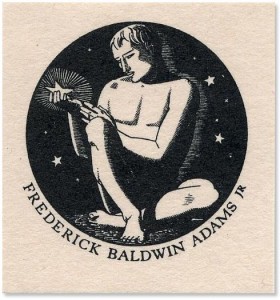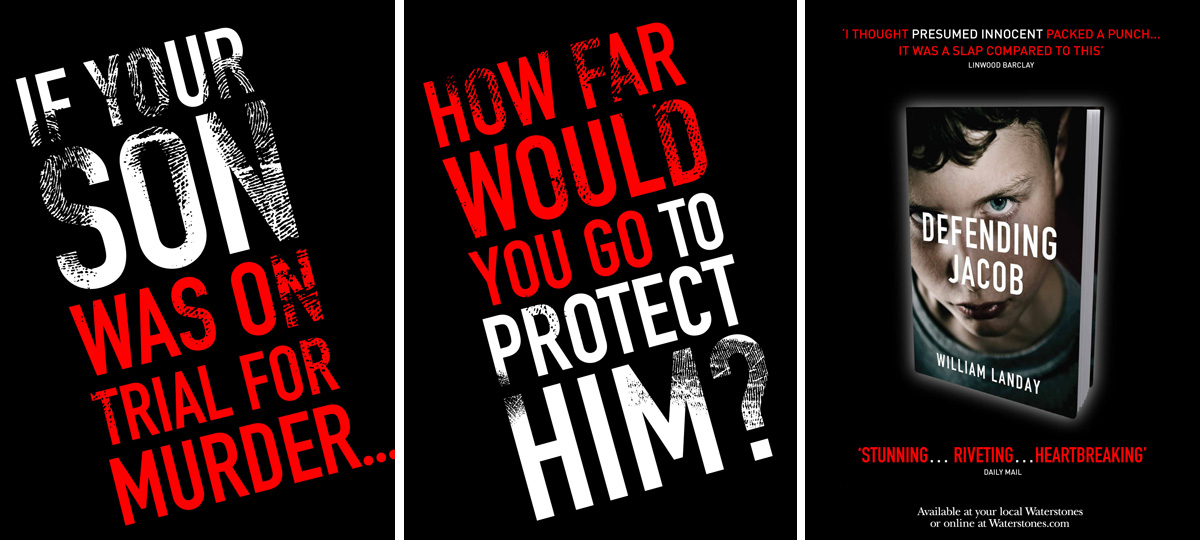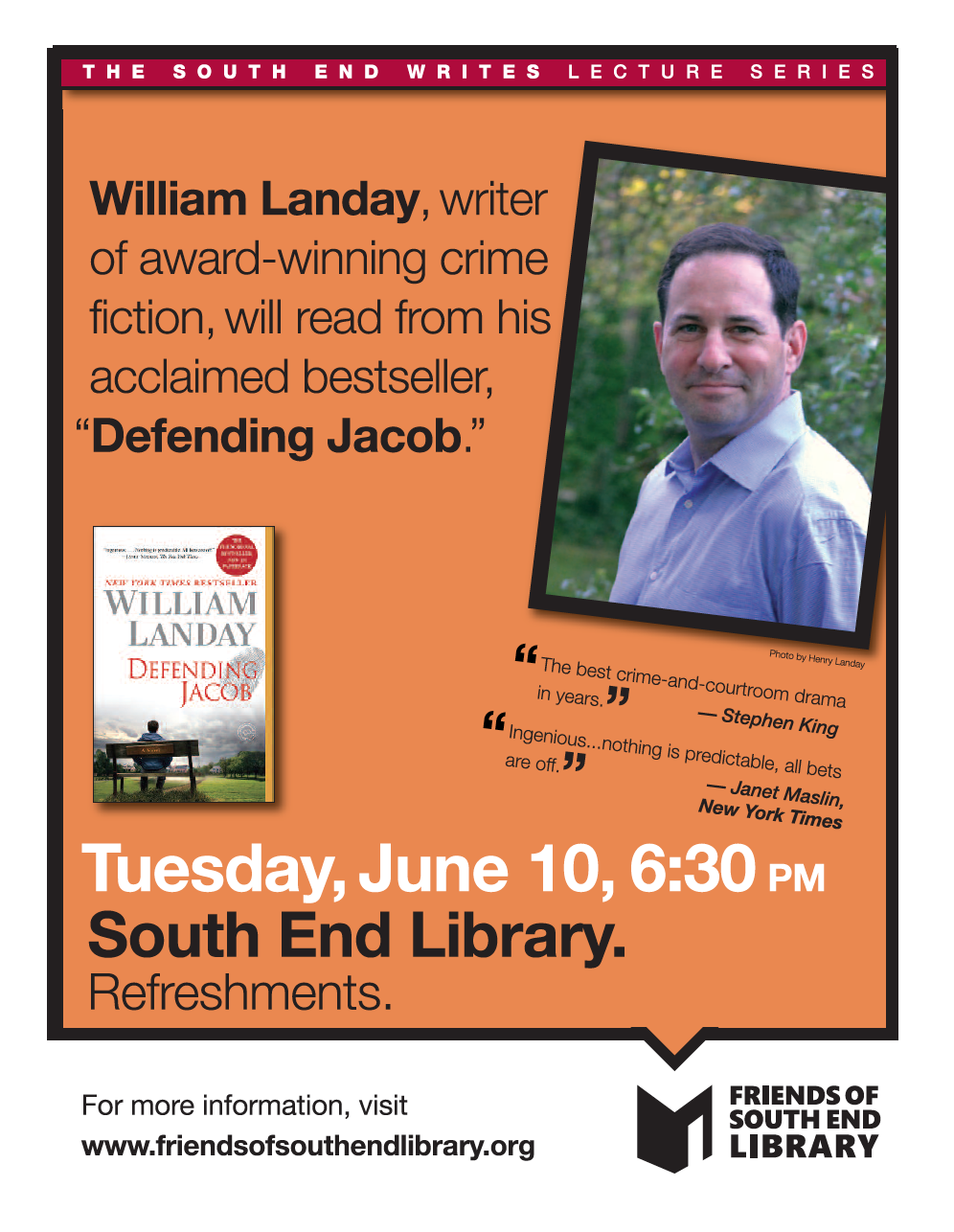publicity
Best Book Trailer Ever
The trailer for my friend John Kenney’s wonderful new debut novel, Truth in Advertising (available January 22). Best book trailer ever.
Ex Libris
 I’ve just received a new shipment of these bookplates. They are for readers who would like a signed book but can’t make it to a book signing. If you’d like one, just email me with your address and, if you want a personal inscription, what you would like it to say. There is no charge. It’s just a way of saying “thank you” to readers. (Click the image to view full sized.)
I’ve just received a new shipment of these bookplates. They are for readers who would like a signed book but can’t make it to a book signing. If you’d like one, just email me with your address and, if you want a personal inscription, what you would like it to say. There is no charge. It’s just a way of saying “thank you” to readers. (Click the image to view full sized.)
A little background on the design. The woodcut illustration is by the artist Rockwell Kent. It was originally commissioned by the Antioch Bookplate Company for a mass-market bookplate in the 1950s. Those Antioch bookplates used to be very common. You could find them at any bookstore. They were tasteful, inexpensive and, for the genteel middle class, a little aspirational. (My mom had them.)
Kent was a prolific bookplate designer. Most of his work was for friends and private clients, though, like the plate on the left. (Source. More examples here and here. There is even a book on Kent’s bookplates.) The series he designed for Antioch made it possible for everyone to have a Rockwell Kent bookplate.
Antioch stopped printing bookplates a few years ago, but Karen Gardner has continued the business under the name Bookplate Ink, where you can still get many of the old Rockwell Kent designs.
Personally, I love Kent’s art. So when it came time to order a bookplate for my readers, I asked Karen if she would modify one of Kent’s designs to make a little more space for a signature and inscription, since the original design left only enough space for the owner’s name. I cribbed the “compliments of” line from a similar bookplate offered by Alain de Botton, and the result is what you see above.
I admit it’s a little loony to spend so much time thinking about bookplates. In the age of ebooks, soon there may be nothing to stick them on. All the more reason to enjoy them now.
London Tube campaign

With our UK publishing date fast approaching, Orion will soon have this outrageously cool series of posters displayed alongside the escalators at select London Tube stations. Jacob is coming, Londoners — and he doesn’t look happy. (Defending Jacob will be published in the UK on March 15. Click image to view it larger.)
Public Writer, Private Writer
Preparations continue for this winter’s publication of Defending Jacob. The cover art is locked in (sneak preview soon). Yesterday I spent six hours being photographed on Boston street corners in various brooding writerly poses. This morning comes news that the book has sold in China, making it the rare product that we export to them. (Hang on, America, just a few more books and I’ll get this darn trade deficit turned around.)
But the strangest bit, to me, is that I will soon go off on a “pre-publication tour.” In September and October, I will visit regional trade shows for independent booksellers in New England, Chicago, Detroit, Minneapolis, southern California (Long Beach) and northern California (San Francisco). I am delighted to do this, of course. Author tours, pre- or post-publication, are rare today. Not penny-on-the-sidewalk rare — unicorn rare. So I’m very grateful to my publisher for putting increasingly scarce resources behind my book.
At the same time, I can’t help thinking that I am a hell of a lot less interesting in person than I am in my books. In person, I am a perfectly pleasant guy, I suppose, but no author can replicate the intensity and intimacy of a good reading experience. Most authors I’ve met? Meh, the book was better. That’s the nature of reading, which requires the reader to conjure the author’s voice out of squiggles on the page. Inevitably the voice you, the reader, create in your head has a special quality. It seems to come from inside you, it seems to originate in your own thoughts. A good book hijacks the inner voice that burbles constantly in every reader’s head. That’s what makes the medium so powerful: the story takes place inside the reader’s consciousness. No wonder the author’s voice seems so familiar and authoritative.
The author’s voice is not my real, conversational voice, of course. When you read my books, you hear only my most articulate, well-crafted sentences. My best and most refined self. That’s what good writing is. The rest — the clumsy phrases, the not-quite-right words or metaphors, all the inarticulate flubs that characterize ordinary speech — is edited out. Even my realistic dialogue is not quite real, the quotation marks notwithstanding. It is shaped, polished, crafted, improved. Every stammer and stumble is calculated for its precise effect. It is the way you would talk if you had a writer scripting your life. (How great would that be?)
Surely readers know all this, but they crave the writer’s personal presence anyway. They want to meet the awkward, bashful, inarticulate writer behind the exalted, hyper-articulate authorial voice they’ve heard in their heads. That’s why there are bookstore readings and author tours and Oprah (well, there used to be Oprah).
[Read more…] about Public Writer, Private WriterThe end of the shy author?
What usually gets lost in the perpetual refrain about authors becoming their own marketers is that there’s no particular connection between writing talent and a gift for self-promotion.
— Laura Miller, “Writer, Sell Thyself”
In a world where authors are expected to self-promote — and someday, perhaps, self-publish — would Salinger or Harper Lee or Thomas Pynchon, reclusive introverts all, have found an audience? Are we about to lose the writer, however brilliant, whose only gift is writing? Read the article.
No such thing as a bad review
A study uses negative book reviews to test the old saw that “all publicity is good publicity.” The result: for the most part, it is better to be trashed by the Times than ignored by it.
A crucial factor, they concluded, is how familiar a brand or product or other entity was before the negative publicity. Crunching data that cross-matched book sales against critics’ appraisals in The New York Times Book Review, they found that negative reviews of a new book by an “established” author hurt sales. “For books by relatively unknown (new) authors, however, negative publicity has the opposite effect,” increasing sales by 45 percent over their expected sales trajectory, they write. Evidently this boils down to increased awareness: the mere act of introducing something to a broader public — even by saying that it stinks — increases the chances that more members of that public will want it anyway.
Follow-up studies pointed out that as time passes, we may not remember the context in which we heard of something (a pan); we just know it’s familiar.
Why authors should (and shouldn’t) blog
I began this blog for a purely mercenary reason: to sell more books. But I discovered to my surprise that I enjoy doing it. Good thing, too, because after three months at it I seriously doubt this blog will ever be an effective sales tool.
Of course, the logic behind author blogs is unimpeachable. The blog attracts new readers as flowers attract bees. These new readers, stupefied by the insights to be found here, return again and again until they decide they simply must have more, at which point they rush out (or more likely click) to buy a book, which they take to be like a blog post only very much longer. Or something like that.
The problem is not that this sort of thing cannot happen. It does. It has happened to me, in fact. The problem is that, as book-selling strategies go, this one is massively inefficient. The number of visitors is just too small to justify the investment of time. More important, counterintuitive as it sounds, most visitors to this blog simply aren’t interested in my books.
In the first few months of my blog’s existence, the overwhelming majority of traffic has come from Google. (I know this because statistics about blog traffic are harvested by several services.) Google referrals tend to be one-time visitors, not regulars. And they come looking for all sorts of things. Here is a small sample of the Google searches that have led people here: “Boston + movies,” “friends of eddie coyle,” “philip roth writing method,” “Graham Greene words per day,” “alphasmart neo.” Do you see a pattern? Me neither. Well, I see one: often as not, these people are not Googling “William Landay.” Of course I’m delighted to have visitors stumble upon my blog this way. That is the whole flowers-and-bees strategy, after all. But there is no reason to expect that these readers will be easy to convert to fans. Most of them have never even heard of me. A few I might be able to sway, but how many and at what cost in time?
Of course, a fraction of my blog traffic does come for the “right” reasons, that is, they enjoy my books or my blog, or both. For them alone, writing this blog would be worthwhile, not because it is going to goose them into reading my books (they already do that), but because core fans want and deserve a place where they can get a better sense of the writer behind the books or even contact him. What’s more, it is valuable to me to have them here. Novel-writing is a grueling, solitary business. The company of these readers — the occasional messages they send or comments they leave, the encouragement — is enormously heartening.
Which leads me to the main point. Even though a blog may never yield a single additional sale, I heartily recommend that all writers launch one anyway. Just remember why you are doing it: because you enjoy it, not because you think it will turn you into a bestseller. Only your books — and a boatload of luck — can do that.
Of course if you are blogging for pleasure rather than to impress potential book-buyers, your blog will look a little different. It will be a truer reflection of yourself, your personality, your quirky tastes. This blog has been a little dry and generic, I think. I have been reluctant to post anything that was not “A” material, longish essays full of deepish thoughts. The result has been a blog with none of the serendipity that characterizes the blogs I enjoy most.
Take Terry Teachout’s blog about theater and the arts, About Last Night. I have been reading ALN for years with great pleasure because I never know what I will find there. It might be a longish essay full of deepish thoughts, but it also might be a YouTube video, a snippet from a book Terry is reading, a notice of an art exhibit. The randomness is what makes it fun.
I am going to tack in that direction myself here. The last few days I have posted a quote, a picture, a video, and a poem, little stuff I would previously have bit.ly’ed and lobbed into the bottomless black hole of Twitter. Look for more of that. Finds like these are what “web logs” originally were: scrapbooks of the interesting nuggets people ran across as they went sniffing around the web. It’s why blogs like Terry Teachout’s work so well, why they keep renewing themselves with a mix of found and original material. This blog should be more fun than it has been, for you and me both.
